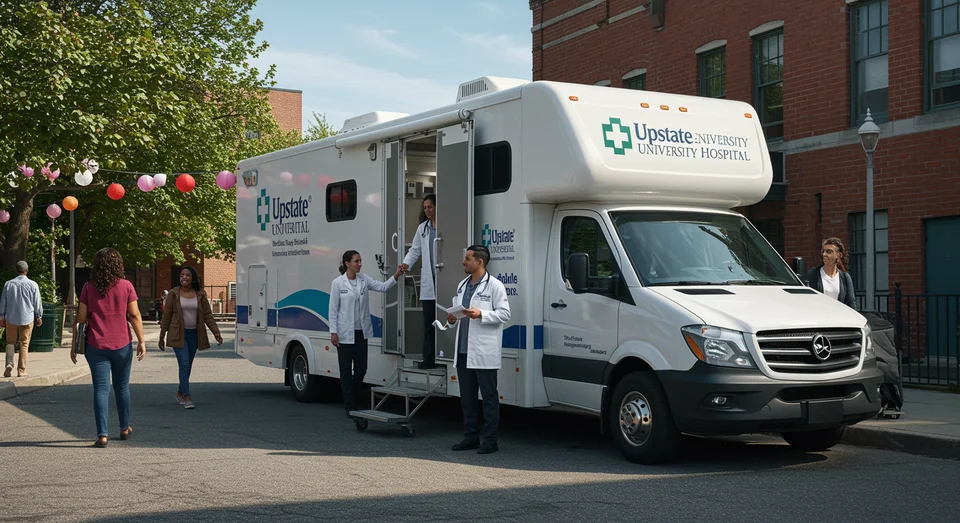Upstate University Hospital’s Mobile Mammography Van Brings Breast Cancer Screening to Central New York
185 views
Upstate University Hospital’s mobile mammography van, a beacon of hope and accessibility in the fight against breast cancer, will traverse 20 locations across Central New York from April through the end of summer. This clinic on wheels offers mammograms to women aged 40 and older, regardless of insurance status, ensuring that early detection is within reach for communities often overlooked in traditional healthcare settings. Since its inception in 2019, the initiative has screened nearly 4,800 women, identifying 20 cases of breast cancer—each a testament to the lifesaving potential of accessible care.

A Lifeline on Wheels: Bridging Gaps in Breast Cancer Screening Across Central New York
The mobile mammography van, an innovation that marries convenience with critical healthcare, serves as both a literal and figurative vehicle for change. Equipped with a reception area, changing space, nursing exam room, and imaging suite, the van transforms parking lots and community centers into hubs of medical care. Licensed radiologists review the imaging results, ensuring the same level of expertise found in brick-and-mortar facilities. For women with a prescription, the process is swift, taking less than 30 minutes, while those without a prescription can undergo a clinical breast exam by a nurse, who then provides the necessary documentation—a slightly longer but equally thorough pathway to screening.
This initiative is not merely about logistics or technology; it’s about breaking down barriers. For uninsured women, for those juggling multiple jobs, or for those living miles away from the nearest hospital, the van represents a lifeline. It eliminates the need for lengthy commutes, reduces time away from work or family, and offers care without the intimidating formalities that often accompany hospital visits. By bringing screenings directly to neighborhoods, the program ensures that no woman is left behind in the battle against breast cancer.
The urgency of this mission is underscored by sobering statistics: breast cancer remains the most commonly diagnosed cancer among women in New York, with nearly 16,000 new cases and 2,500 deaths annually. Early detection is paramount, as it significantly increases the chances of successful treatment. Yet, disparities in access to healthcare mean that many women are diagnosed at later stages, when options become limited and outcomes less favorable. Upstate University Hospital’s mobile unit is a direct response to these inequities, offering a proactive solution to a deeply entrenched problem.
The process itself is designed with simplicity and efficiency in mind. Patients are advised to bring a photo ID and insurance information if available, though screenings are provided regardless of coverage. To ensure accurate imaging, women are asked to avoid using deodorants, lotions, or powders in the breast or underarm area on the day of their appointment. Results are delivered within two weeks via the Upstate MyChart account, or by mail within 30 days for those without an account, ensuring timely follow-up and peace of mind.
While the numbers tell a compelling story of reach and impact—nearly 4,800 women screened and 20 breast cancer diagnoses since 2019—it’s the individual stories that breathe life into the initiative. Each woman who steps into the van carries with her a unique set of fears, hopes, and circumstances. For some, it’s their first mammogram, a step they’ve delayed due to financial constraints or lack of nearby facilities. For others, it’s a routine screening made easier by the van’s presence in their community. In every case, the van serves as a reminder that healthcare should not be a privilege, but a right accessible to all.
The program also highlights the importance of community partnerships in addressing public health challenges. By collaborating with local organizations and utilizing public spaces, Upstate University Hospital ensures that the van’s reach extends far beyond urban centers, touching rural areas where medical resources are often scarce. This model of care could serve as a blueprint for other regions grappling with similar disparities, demonstrating that innovation in healthcare delivery doesn’t always require cutting-edge technology—sometimes, it’s about meeting people where they are.
As the van embarks on its summer tour, it carries with it not just medical equipment, but a message of empowerment. It reminds women that their health matters, that early detection saves lives, and that no obstacle should stand in the way of care. For communities across Central New York, the van’s arrival is more than a scheduled visit; it’s a promise of hope, a chance for prevention, and a step toward equity in healthcare.
The broader implications of such initiatives are profound. In a healthcare landscape often criticized for its inefficiencies and inequities, programs like Upstate University Hospital’s mobile mammography unit offer a glimpse of what’s possible when innovation is paired with compassion. They challenge the notion that quality care must be tethered to physical institutions, proving that mobility can be a powerful tool in bridging gaps and saving lives.
As summer unfolds and the van makes its way through Central New York, it will undoubtedly leave an indelible mark—not just in the statistics it generates, but in the lives it touches. For the women who step aboard, it offers more than a screening; it offers dignity, reassurance, and the knowledge that someone is looking out for them. And for the communities it serves, it’s a reminder that healthcare can be as dynamic and adaptable as the people it aims to protect. In the fight against breast cancer, this van is more than a clinic on wheels; it’s a symbol of hope on the move.
